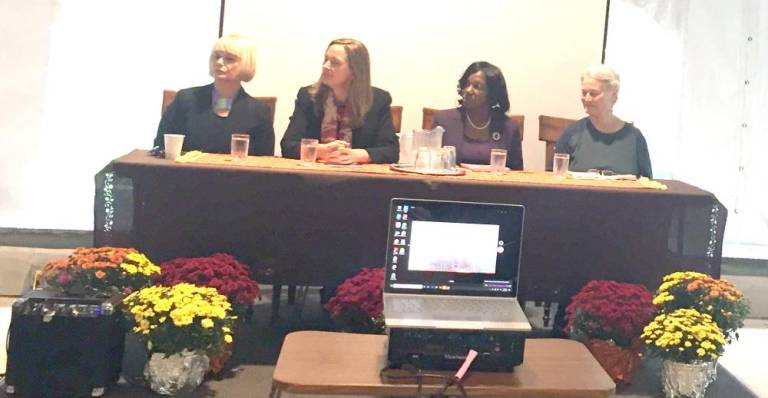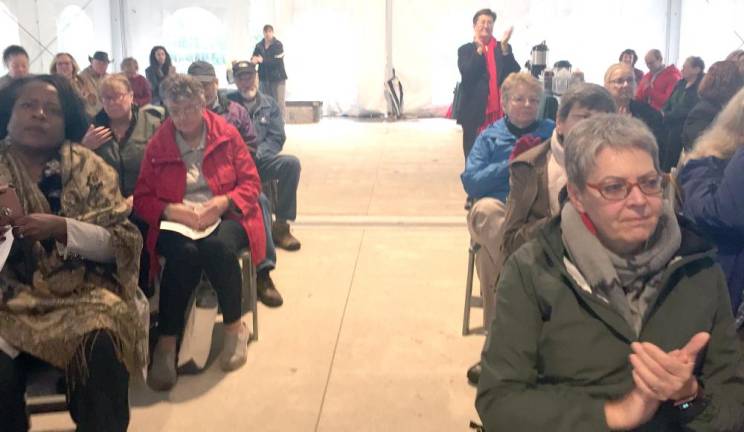A league of their own: Panelists and public celebrate 100 years of women's suffrage
Milford. Forum at Grey Towers asks compelling questions: What are we teaching our sons? How does grammar influence our thinking about gender? Do women vote as a block? How do we fight the inertia of complacency?


The room at Grey Towers was filled with women of all ages and backgrounds, both on the panel and in the audience. Many fought the good fight in the '60s and '70s. There were also 20-somethings and women in their late teens who are just beginning to see the injustices women are still enduring.
The League of Women Voters of Pike County on Sunday joined the Grey Towers Heritage Association and the U.S. Forest Service to kick off a year-long centennial celebration of the 19th Amendment to the U.S. Constitution giving women the right to vote. The panelists agreed the biggest problem today is complacency. The equality that came with the vote stopped with the vote, they said, and women’s equality in the workplace is still not realized.
It was fitting that this event was held at Grey Towers National Historic Site, since the tireless work of its original occupant, Cornelia Pinchot, helped to bring about the amendment's passage.
Lori McKean of the U.S. Forest Service welcomed people and provided background on the work of Cornelia Pinchot and the women’s movement. Marian Keegan, president of the Grey Towers Heritage Association, also gave a welcome.
U.S. Rep. Matt Cartwright (8th PA District) spoke about the politically active women in his own family and the importance of honoring women’s rights. Liz Forrest, president of the League, talked about some of Cornelia Pinchot’s activities and the fact that her husband, Gifford Pinchot, worked for the same ideals – human rights and social justice. In fact, Grey Towers was like a “political boarding house,” where high-level politicians and statesmen came for dinner and conversation.
The women on the panel all work in support of women’s education, defense, equality, and leadership.
It's hard to pigeonhole women
Siobhan “Sam” Bennett is the chief strategic officer and senior vice president of the Women’s Defense and Education Fund. Elowyn Corbyn is the Vision 2020 Program Manager at the Institute for Women’s Health and Leadership at Drexel University College of Medicine.Tameko Patterson is serving her fourth year as president of the Greater Pocono Section of the National Council of Negro Women, Inc. Mary Zimmerman is the immediate past-president of the Lewisburg League of Women Voters and has been a lecturer on women’s history at various colleges. She was the historian of the group.
Each of these impressive women brought a different perspective to the evolving discussion of women’s rights and the current state of the movement. Forrest moderated the conversation and asked questions, like: “Have women traditionally voted as a block?”
The answer was no. The panelists said women are a diverse group. They often vote for the interests of other groups, and encourage people to vote.
Patterson said African-American women and men are still fighting for equality today, when they are asked to provide identification at the polls.
The panelists felt there is a lot more work to do, particularly in including gender protections in the 1964 Equal Rights Act, which has now expired.
Suzanne Braun Levine, the first editor of Ms. Magazine and an ardent feminist, was in the audience. She quietly noted that we should not use the term “suffragettes,” since the “ -ettes” suffix is demeaning and almost “frilly." (The suffix makes the thing named both feminine and diminutive.) We should, instead, refer to these early heroes as “suffragists,” patterned after “feminists,” a more generalized term like “populist" or "theorist."
One of the questions asked of the audience was, “What are we teaching our sons?”
The answer was, perhaps slightly tongue-in cheek, “that women, who birth the babies, maintain jobs and the household and are capable of multi-tasking, are superior.”